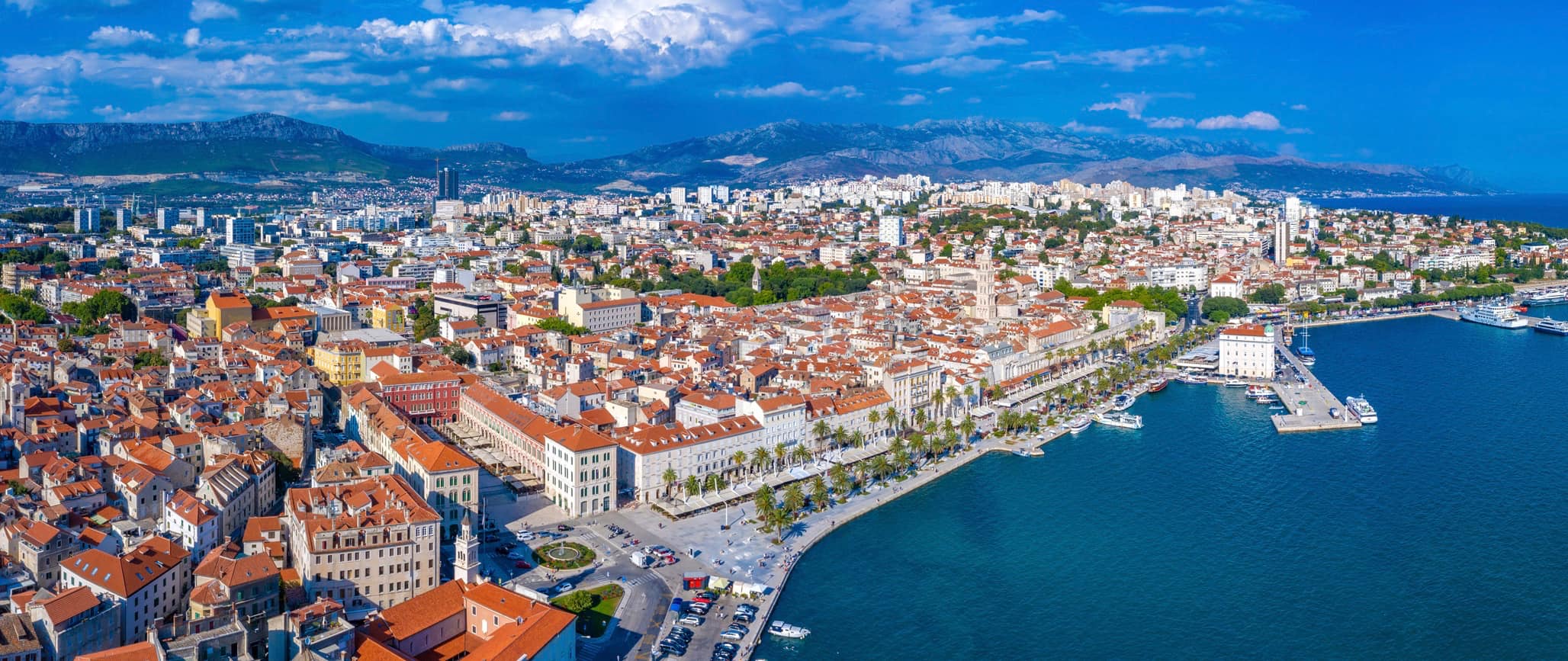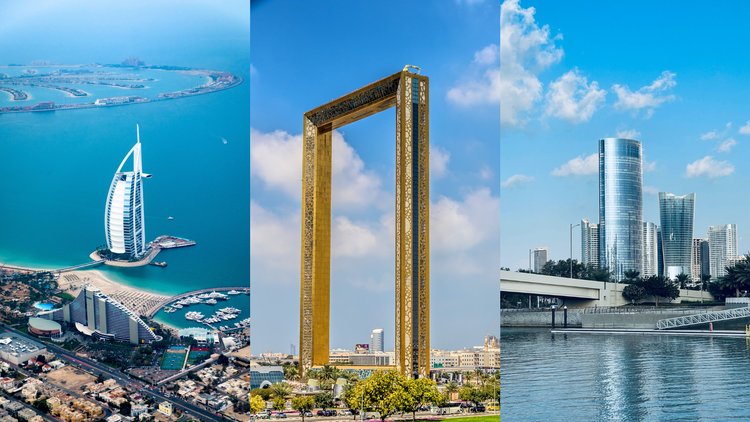Split is a Mediterranean gem combining ancient history with modern vitality that so captivated me when I first visited. Split is more than just a picturesque seaside city – it’s a destination that combines Roman heritage, charming streets, and vibrant culture into a perfect escape for travelers. You’ll learn everything you need to know about the best things to do in Split, essential travel tips, where to stay, how to stay safe, and money-saving tips in this ultimate guide. In the end, you’ll understand what to expect in this fascinating city and how to enjoy it to the fullest.
Here is a list of the top ten things you need to see and do in Split
From history buffs to beach lovers, foodies to adventure seekers, Split has something for everyone. These are the top 10 experiences you shouldn’t miss:

1. Take a tour of Diocletian’s Palace
One of UNESCO’s World Heritage Sites, Diocletian’s Palace, is at the heart of Split. The ancient Roman imperial complex is more than a museum; it’s an active part of the city. This palace was built in the 4th century, and its remnants are almost impossible to miss as you walk through Split. Taking in the history and admiring the grandeur of this ancient structure, I wandered through the narrow alleyways. The interior is filled with historical sites, shops, cafes, and hidden gems.
2. Stroll along Riva Promenade
Split’s lively seafront is the Riva Promenade, where the city meets the Adriatic Sea. Its palm-lined paths and many cafes offer a unique opportunity to catch the pulse of the city as you stroll along its palm-lined paths. There are views of the turquoise sea, ancient Roman architecture, and people from around the world as you stroll here. It is impossible to ignore the Riva’s charm, making it a must-see for anyone visiting Split.
3. Take a break at Bačvice Beach
It’s just a short walk from Split’s city center to Bavice Beach, Split’s most famous beach. With shallow waters, it’s the perfect place to unwind or play picigin—a quirky, fast-paced ball game played in the water. When I visited, I soaked up the sun, went swimming, and chatted with locals. You can enjoy a cold drink while watching the sunset at the beach’s cafes and bars.
4. Take a trip to the Cathedral of Saint Domnius
One of Split’s most iconic landmarks is the Cathedral of Saint Domnius, originally built as Diocletian’s mausoleum. From the cathedral’s bell tower, you can see the entire city and its surrounding coastline. Climbing the tower offered spectacular views of Split from above (a little challenging but totally worth it).
5. Walk around Peristyle Square and admire it
The Peristyle Square, located in the heart of Diocletian’s Palace, is a grand open space filled with columns and arches. Here you’ll find the Cathedral of Saint Domnius and the Temple of Jupiter. It was impossible not to marvel at the beauty of the architecture and feel transported back to the days of the Roman Empire as I walked through. It is a great spot for photos or just to sit and enjoy the atmosphere in the Peristyle.
6. Visit the Archaeological Museum
Split’s Archaeological Museum is a great place to learn more about its past. You will find exhibits detailing the city’s Roman, medieval, and early Christian heritage here. From ancient coins to sculptures, I enjoyed seeing how the museum preserved and displayed historical artifacts. If you’re interested in learning more about Split, this is a great place to visit.
7. Enjoy stunning views from Marjan Hill
One of Split’s best views can be found on Marjan Hill, the city’s green lung. You can hike up the hill to scenic viewpoints that overlook Split, the harbor, and nearby islands, whether you’re an experienced hiker or just up for a leisurely stroll. The panoramic vistas were the perfect reward for hiking all the way to the top. With its forested paths, the hill also offers peace and quiet.
8. Spend a day on the island of Hvar
It is easy to take a ferry from Split to the nearby island of Hvar. With stunning beaches, quaint villages, and impressive historical sites, Hvar is a beautiful destination with a glamorous vibe and vibrant nightlife. Visited the Fortress Fortica for its breathtaking views and sipped wine by the sea while exploring the medieval town of Hvar. You can combine history, relaxation, and fun on this day trip.
9. Visit the Split Fish Market
Visit the Fish Market (Pazar) near the Diocletian’s Palace for a taste of Split life. You’ll find fresh seafood, local produce, and artisan goods here. As I wandered through, I was struck by the vibrant atmosphere, friendly chatter, and colorful stalls. You can pick up some souvenirs, taste local delicacies, or just immerse yourself in the culture.
10. Visit the Ivan Meštrović Gallery
It is a must-visit gallery if you appreciate art. It is dedicated to the works of Croatian sculptor Ivan Meštrović, whose pieces are displayed in this former family villa. A range of sculptures, sketches, and other works provide a glimpse into the artist’s life and legacy. A stunning view of the sea can be enjoyed from the gallery, which is situated in a beautiful location.
Here are 11 more things you can do if you are in Split
In addition to these top 10 attractions, Split has even more to offer for those who wish to go beyond the usual tourist spots and explore the city beyond the usual tourist sites. You might want to consider the following 11 additional activities as well:
1. Take a tour of hidden courtyards in the city
There are many hidden courtyards tucked away from Split’s main streets. In addition to beautiful gardens, cafes, and quaint shops, these peaceful hideaways offer a quiet retreat from the hustle and bustle of the city.
2. Visit the Split Green Market
The Green Market (Pazar) is a great place to buy local produce and souvenirs. As I walked around, I snacked on some delicious olives and fresh figs.
3. Visit the Gallery of Fine Arts
Featuring artwork from Croatian artists spanning several centuries, the Gallery of Fine Arts is a must-see for art lovers. In contrast to the city’s Roman ruins, the gallery is housed in a beautiful building.
4. Take a Boat Trip to the Blue Cave
A popular excursion from Split, the Blue Cave on Biševo Island is an incredible natural wonder. When the sun is directly overhead, the cave’s unique blue light is most striking.
5. Visit the Ethnographic Museum
A fascinating look at local culture and history can be found at Split’s ethnographic museum. It’s a great place to learn about Croatian traditions, costumes, and crafts.
6. Take a tour of Trogir
Within a short drive of Split is the medieval town of Trogir, a UNESCO World Heritage Site. It was a pleasant afternoon strolling through narrow streets and admiring the picturesque harbor.
7. Attend a Festival in Split
Split hosts several festivals throughout the year, including the Split Summer Festival, which includes music, theater, and dance performances. When planning your trip, check the local calendar to see if any events coincide.
8. Enjoy Split’s Cafés and Bars
Split has a thriving café culture. I loved spending time at various cafés, people-watching and soaking in the atmosphere. The bars, especially along the Riva, offer a perfect setting for a sunset cocktail.
9. Go Wine Tasting
Split is located in the heart of Croatia’s wine country, and there are plenty of opportunities to taste local wines. I joined a wine-tasting tour, where I learned about the region’s wine-making traditions while sampling a selection of wines paired with local cheese.
10. Take a Cooking Class
Croatian cuisine is diverse and delicious, and taking a cooking class is a fantastic way to immerse yourself in the local food culture. I took a class where I learned to make traditional Croatian dishes like peka (a slow-cooked meat and vegetable dish), which I then enjoyed for dinner.
11. Stroll Through the Old Town
Split’s Old Town is a maze of narrow streets, lively squares, and hidden courtyards. I spent hours simply wandering around, discovering charming cafes, local shops, and beautiful architectural details. It’s a great way to experience the local vibe.
Here are some tips on how you can stay safe in Split
The city of Split is generally considered to be a very safe destination for travelers. In spite of this, as with any tourist destination, it is important to take a few basic precautions to keep yourself safe:
Taking precautions against pickpockets is very important, especially in crowded areas such as the Riva Promenade and the markets. Although pickpocketing is rare, it is always better to be cautious in order to prevent it from happening.
Stay hydrated: It is important to stay hydrated during the summer months when the Mediterranean heat can be intense. To stay hydrated, make sure you always carry a water bottle with you, and be sure to use sunscreen to protect your skin.
Medical Care and Health Care: Croatia has a good healthcare system, but travel insurance is recommended in case of any medical emergency that may arise during your trip. Split has a wide variety of pharmacies to choose from.
Where to Stay in Split
There are a wide range of accommodation options available in Split, ranging from luxury hotels to budget-friendly hostels. The following are some of the top choices based on your budget:
| Type of Accommodation | Location | Price Range (per night) | Rating (out of 5) |
|---|---|---|---|
| Luxury Hotel | Near the Riva | €150 – €250 | 4.5 |
| Mid-Range Hotel | Old Town | €80 – €150 | 4.3 |
| Budget Hostel | City Center | €20 – €50 | 4.0 |
| Airbnb | Old Town/Marjan Hill | €50 – €100 | 4.6 |
Luxury:
If you’re looking for luxury, the Palace Judita Heritage Hotel is a perfect choice. Located within Diocletian’s Palace, this hotel combines history with modern comfort. The rooms are beautifully appointed, and the service is top-notch.
Mid-Range:
For those traveling on a moderate budget, Hotel Vestibul Palace offers a blend of historic charm and modern amenities. The hotel is located in a peaceful part of Split’s Old Town, and I found it to be an ideal base for exploring the city.
Budget:
For budget travelers, Hostel Split is a great option. Located near the city center, it offers clean, basic accommodation with a friendly atmosphere. It’s perfect for travelers who need a place to sleep but want to spend their money exploring the city.
Typical Costs in Split
The city of Split offers a wide range of accommodation options depending on your travel style and preferences. A breakdown of typical costs can be found below:
| Item | Cost (€) |
|---|---|
| Meal at a local restaurant | €10 – €25 |
| Coffee | €2 – €4 |
| Bus Ticket (one way) | €1.5 |
| Entrance Fee (Museum/Attraction) | €5 – €10 |
| Taxi (within the city) | €10 – €20 |
Food in Split
There are many influences from Italy, Turkey, and Hungary in the cuisine of Croatia, which makes it hearty and flavorful. In Split, I highly recommend that you try the local seafood, particularly fresh Adriatic fish and octopus dishes, while you are there. Here are some of the dishes you might want to try:
The pasticada is a stew made from beef that is simmered slowly for hours
Croatian peka is a traditional dish that consists of meat and vegetables cooked under a lid shaped like a bell
A fritule is a small doughnut that is usually served for dessert as part of a meal
Accommodation
The range of accommodation in Split caters to every budget. From luxury stays to budget-friendly options, there’s something for everyone.
Suggested Budget for Split
| Budget Type | Daily Cost (€) |
|---|---|
| Budget | €40 – €70 |
| Mid-Range | €80 – €150 |
| Luxury | €200+ |
Money-Saving Tips for Split
It is recommended that you stick to local cafes or konobas (taverns) where you’ll be able to find delicious meals at a reasonable price.
You can also use public transportation in Split, as the city has a good public transportation system, and a single bus ride costs very little.
It is often the case that booking tickets in advance can result in you saving money when it comes to popular attractions.
Choosing to stay in an Airbnb apartment can be more cost-effective than staying in a hotel.
Here are some tips on how to get around Split
A great deal of public transportation is available in Split, including buses, taxis, and ferries. The following are some of the best ways to get around the city:
Walking is a great way to explore Split’s Old Town, as it is compact and easy to walk through.
Taking the bus is an inexpensive and reliable way to get around.
Taxis: Taxis are available in the city, but they can be quite costly. It is always a good idea to ask for the meter to be used.
Split is well-connected with nearby islands by ferries, and it is a wonderful way to get around and explore the surrounding area if you choose to take the ferries.
When to Go to Split
The best time to visit Split is from May to October, with peak summer months (July and August) offering the warmest weather and most festivals. However, visiting in May, June, or September will allow you to avoid the heaviest tourist crowds while still enjoying pleasant weather.
Best Places to Book Your Trip to Split
- Booking.com: Great for comparing hotels, apartments, and hostels.
- Airbnb: A fantastic option for renting apartments in the heart of Split.
- Ferry Tickets: Book ferry tickets to nearby islands in advance through websites like Jadrolinija.












